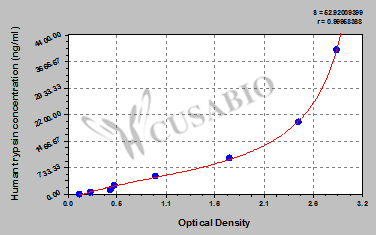The human Trypsin ELISA kit is suitable for the quantitative determination of human Trypsin in different sample types, including serum and plasma. This assay employs the bi-antibody sandwich technique and enzyme-substrate chromogenic reaction to quantify antigen levels in the sample. The amount of synthesized colored products is positively related to the analyte of interest in the sample.
Trypsin (PRSS1) is a serine protease produced in the pancreas in the precursor form of inactive trypsinogen by enterokinase. Trypsin is renowned for its role in enteric digestion. In the small intestine, trypsin breaks down proteins, continuing the process of digestion that began in the stomach. It has potent proteolytic activity, and inappropriate activation of trypsin may result in severe pathological states in various human diseases. Extra-pancreatic expression of trypsin has been detected in several cancer types. Trypsin is involved in colorectal carcinogenesis and promotes proliferation, invasion, and metastasis.






